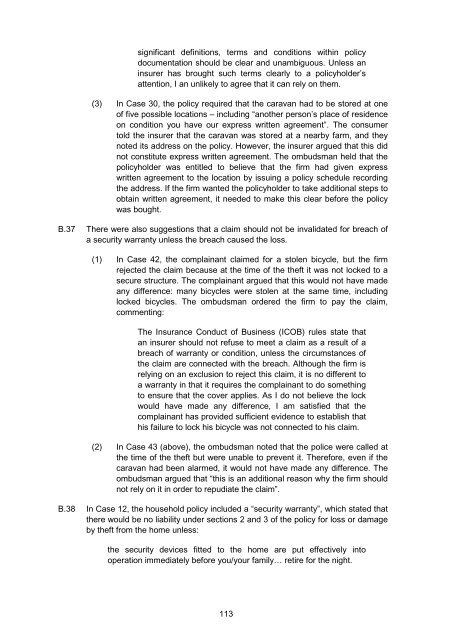Insurance Contract Law Issues Paper 2 Warranties - Law Commission
Insurance Contract Law Issues Paper 2 Warranties - Law Commission
Insurance Contract Law Issues Paper 2 Warranties - Law Commission
You also want an ePaper? Increase the reach of your titles
YUMPU automatically turns print PDFs into web optimized ePapers that Google loves.
significant definitions, terms and conditions within policy<br />
documentation should be clear and unambiguous. Unless an<br />
insurer has brought such terms clearly to a policyholder’s<br />
attention, I an unlikely to agree that it can rely on them.<br />
(3) In Case 30, the policy required that the caravan had to be stored at one<br />
of five possible locations – including “another person’s place of residence<br />
on condition you have our express written agreement”. The consumer<br />
told the insurer that the caravan was stored at a nearby farm, and they<br />
noted its address on the policy. However, the insurer argued that this did<br />
not constitute express written agreement. The ombudsman held that the<br />
policyholder was entitled to believe that the firm had given express<br />
written agreement to the location by issuing a policy schedule recording<br />
the address. If the firm wanted the policyholder to take additional steps to<br />
obtain written agreement, it needed to make this clear before the policy<br />
was bought.<br />
B.37 There were also suggestions that a claim should not be invalidated for breach of<br />
a security warranty unless the breach caused the loss.<br />
(1) In Case 42, the complainant claimed for a stolen bicycle, but the firm<br />
rejected the claim because at the time of the theft it was not locked to a<br />
secure structure. The complainant argued that this would not have made<br />
any difference: many bicycles were stolen at the same time, including<br />
locked bicycles. The ombudsman ordered the firm to pay the claim,<br />
commenting:<br />
The <strong>Insurance</strong> Conduct of Business (ICOB) rules state that<br />
an insurer should not refuse to meet a claim as a result of a<br />
breach of warranty or condition, unless the circumstances of<br />
the claim are connected with the breach. Although the firm is<br />
relying on an exclusion to reject this claim, it is no different to<br />
a warranty in that it requires the complainant to do something<br />
to ensure that the cover applies. As I do not believe the lock<br />
would have made any difference, I am satisfied that the<br />
complainant has provided sufficient evidence to establish that<br />
his failure to lock his bicycle was not connected to his claim.<br />
(2) In Case 43 (above), the ombudsman noted that the police were called at<br />
the time of the theft but were unable to prevent it. Therefore, even if the<br />
caravan had been alarmed, it would not have made any difference. The<br />
ombudsman argued that “this is an additional reason why the firm should<br />
not rely on it in order to repudiate the claim”.<br />
B.38 In Case 12, the household policy included a “security warranty”, which stated that<br />
there would be no liability under sections 2 and 3 of the policy for loss or damage<br />
by theft from the home unless:<br />
the security devices fitted to the home are put effectively into<br />
operation immediately before you/your family… retire for the night.<br />
113

















